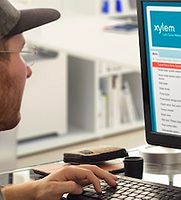Goulds Water Technology trains water professionals online and in person

In April, Goulds Water Technology (GWT), a Xylem brand, announced its second quarter GWT Factory School schedules. The school offers in-person, WebEx and online education to water industry professionals. The school has attracted engineers, distributors, dealers and OEMs; some of which had 30 years of experience and others that were young and just starting in the industry.
The GWT brand includes centrifugal pumps, controllers, variable frequency drives and accessories for agricultural, building trades, commercial and light industrial water and wastewater applications. Prior to GWT becoming a Xylem brand in 2011, it was part of Goulds Pumps as a subsidiary of ITT. Its history dates back to 1848 when Seabury S. Gould purchased a pump-making business that was founded in 1840.
The school has trained thousands of students on the latest advancements in commercial, residential and agricultural applications. In-person classes are available at the Campbell Education Center laboratory, in Seneca Falls, New York, and provide hands-on training in commercial applications, variable frequency drives, water systems and wastewater. The online WebEx courses and e-Learning options are modified into 11 modules and designed for individual comprehension with up-to-date product information, troubleshooting support and industry knowledge.
Training Manager Tom Stephan leads the GWT Factory School. Stephan chatted with me recently about the schools offerings and future opportunities.
AC: Can you start by talking a little about your background in the industry and as GWT trainer?
TS: I began with Goulds Pumps in 1988 as a sales representative for five years. Goulds Pumps eventually became a subsidiary of ITT Corporation, and I held a variety of managerial roles within the company. After a spinoff from ITT in 2011, GWT became a Xylem brand, and since then, I’ve been the GWT training manager. I manage all training programs in residential and commercial water in Seneca Falls, New York, as well as some in Lubbock, Texas. I am also responsible for research, development and implementation of web-based online training.
AC: When did GWT begin offering training and why?
TS: We’ve been offering training for over 30 years. The industry evolves quickly, so there’s a need for continuous education for industry professionals to learn new practices or to brush up on their existing skill set. As technology and energy efficiency continue to play larger roles, industry standards and products, continued training is more important than ever. For example, we have a course to address the recent U.S. Department of Energy ruling on efficiency standards for 1500 HP three-phase electric motors, its impact on the industry and how professionals can adapt to the changes and get ahead of any resulting trends.
AC: What were some of the highlights of the Q1 trainings this year?
TS: Our “Water Systems” class was at full capacity in Q1. The class covers all GWT water system pumps and accessories, including submersible pumps, jet pumps and residential drives. During the three-day class, attendees received valuable, hands-on training in installing, setup and troubleshooting of residential water systems.
AC: The e-learning component is a recent introduction from GWT. How has that been going?
TS: Our e-learning offerings have been positively received. The e-Learning structure is customizable — people can learn at their own pace and from any location. It’s a great solution for people who are unable to travel to the GWT Factory School or cannot coordinate their schedule with the class dates, or want to complement live training with additional online reinforcement. It’s also free for engineers, designers, contractors, building operators and students across the globe.
The e-learning modules cover topics like pump basics, discharge conditions, understanding pump curves, sizing and selecting pumps, pressure storage tanks, and other similar topics. Our newest module is launching later this year and will focus entirely on variable frequency drives.
AC: What feedback, requests, etc. have you heard from attendees?
TS: We’ve received positive feedback regarding our attendees’ experience with the GWT Factory School. The GWT Factory School helps keep industry professionals sharp in both knowledge and skills and also to up-to-speed with new products, trends and techniques. Training has become more hands-on in recent years, and that is helpful for making people comfortable with situations that could come up in the field.
Recently we’ve had numerous requests for variable speed theory and variable frequency drive product training, and we will be offering an additional Advanced Commercial class later this year based on its popularity.
AC: What previews can you give us about GWT’s future training efforts?
TS: Certain classes include plant tours of our manufacturing facility in Auburn, New York. Later in the year, we will take an in-depth look at the new Aquavar SOLO2 variable frequency drive in an online session led by Shukri Elmazi, product manager at Xylem. Participants will learn troubleshooting techniques and possible new applications of the SOLO2.
An online session will be offered in July and December, and will review the changes and the impact of the U.S. Department of Energy Integral Horsepower Motor Rule that covers 1-500 HP three-phase electric motors. Gretchen Valentino, product line manager at Xylem, will be the presenter for that informative class.
In addition to the sessions mentioned above, we are offering another Advanced Commercial class in November to meet demand. We are also developing primer and refresher courses and continuing to expand our e-learning modules to diversify our educational offerings.




